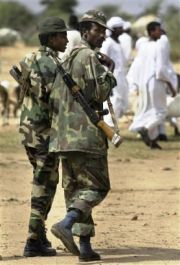FEATURE – Living a restricted life in Darfur
Feb 22, 2006 (KABKABIYA) — On the plains of Kabkabiya town in North Darfur, numerous abandoned villages dot the empty landscape. Their burned remains bear witness to the escalation of the Darfur conflict in 2003.

|
|
Soldiers in a military unit calling themselves variously the Border Intelligence Division, Second Reconnaissance Brigade, or the Quick and the Horrible, also believed to form part of the Janjaweed militia, walk around the weekly animal market in Mistiria in North Darfur, Sudan, Tuesday, Oct. 5, 2004. Mistiria is the home town and base of Musa Hilal, the alleged coordinator of the militia known as the Janjaweed who have been accused of committing atrocities in the conflict in Darfur. (AP). |
“When the conflict began here,” said a community leader who requested anonymity, “the Janjawid [militias] attacked the villages around Kabkabiya, especially to the east and south. They killed many people, took their animals and destroyed their belongings.”
Most of the former inhabitants of the villages at the foot of the Jebel Si mountains are members of the Fur and Zaghawa communities. After losing their homes in the raids, they sought refuge with relatives in Kabkabiya town. Today, internally displaced people constitute 70 percent of the town’s 64,000 residents.
In contrast, the flat plains southwest of the town, which stretch westwards to Saraf Omra and Birkat Seira on the border with West Darfur, are considered by some to be relatively stable. The Sudanese military and government-supported Arab Janjawid militia control the area, and no major fighting has taken place in the region during the past year.
“Rebels depend on the mountains as a base for their operations, so they avoid flat, open land,” said Al Taib Al Kabashi, acting government commissioner of Kabkabiya. “For this reason, the people to the west [of Kabkabiya] feel safe. I drive by myself [without military escort] to Saraf Omra.”
Local observers, who noted that the 140 km road between Kabkabiya and Saraf Omra has about six Janjawid checkpoints, tell a different story.
“There is no peace in this area at all,” said the community leader. “The Janjawid is the government, and the government is the Janjawid. The Janjawid has threatened to kill villagers if they would try to flee to Kabkabiya.”
Restricted within villages
After Janjawid militia attacked and looted their homes in 2003, the inhabitants of the predominantly Fur villages to the south and west of Kabkabiya were left with nothing.
Many of them fled to town, but some 4,000 people from 20 different villages decided to remain.
To ensure their security, they agreed to pay the Janjawid – their former attackers – a “protection-fee” and a share of their harvest, to be collected by the sheikh. According to various local sources, the protection fee was approximately 700 Sudanese dinars (US 35 cents) per family per month in addition to one-third or one-quarter of their harvest.
Over time, a climate of intimidation developed. “They don’t pay to be defended,” said the community leader. “They pay not to be attacked.”
The African communities, who are still paying for “protection”, are virtually held hostage in their own homes by the Janjawid.
“The main problem people are facing is the lack of freedom of movement. Access to the market, to services in nearby towns, to fetch water, to their surrounding fields – it has all been severely hindered,” said Thomas Linde, director of protection for the United Nations Mission in Sudan.
Although the Fur still cultivate their fields, they are restricted to the relative security of the land in the immediate vicinity of their villages. To enter or leave the villages, they must pass through security posts. The checkpoints are manned by Arab militia, who monitor people’s movements, levy taxes and demand food or money.
“They are harassed, threatened or assaulted whenever they move outside their village, and this has a big impact on their livelihoods and their ability to lead a normal life,” Linde said.
“In most of the villages south of Kabkabiya, people are not allowed to leave the village and look for refuge in IDP [internally displaced persons’] camps. They are trapped,” a local observer noted.
The Janjawid want to give the impression to the outside world that different communities in government-controlled areas were coexisting peacefully, he explained. However, under the guise of “protection” they have created a valuable source of income.
The militias harass communities inside the villages as well.
“Armed men come at night and loot their belongings. Sometimes the husbands are ordered to go outside and the men spend the night with their wives,” the observer said. “It is a case of extreme harassment, intimidation and violence. These people live in open prisons.”
No end in sight
The community leader estimated that the situation had been going on for the last one-and-a-half or two years.
“These people are extremely vulnerable, and their coping mechanisms are extremely few. There is very little they can do to protect themselves,” the observer said.
A key problem is that the Fur and Zaghawa ethnic groups are the main recruiting ground for Darfur’s largest rebel movement, the Sudan Liberation Army. Most Arab militia equate members of these African communities with rebels.
“The traditional leadership has lost its ability to negotiate or to find a resolution of the situation, because one side has all the bargaining power,” he added.
Even in Kabkabiya town itself, the displaced population is not secure. Forced taxation and harassment of individuals by Janjawid militia occurs regularly.
“If people don’t pay, they are detained – sometimes for days – and punished and beaten with sticks,” the community leader noted. “In Darfur, now, nobody can defend you.”
